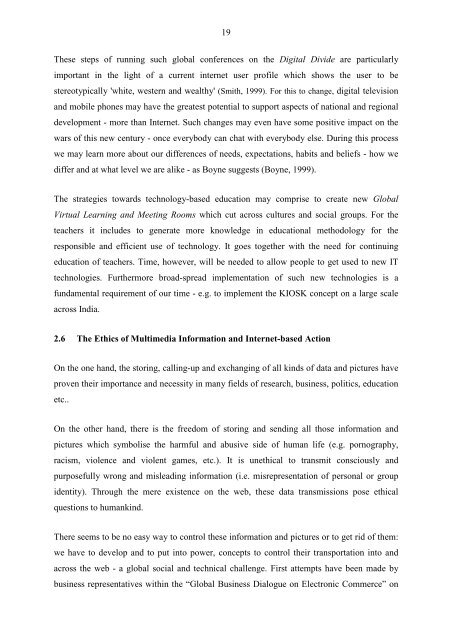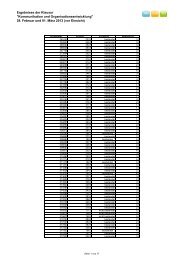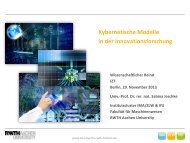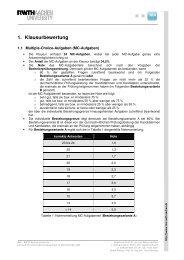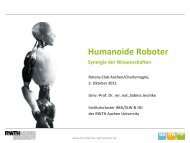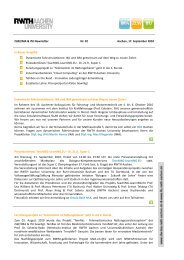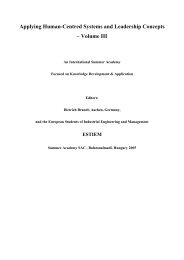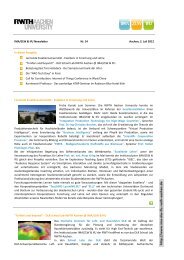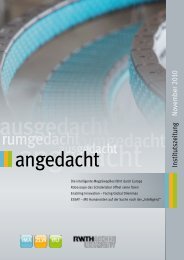Vol. II: Shaping Information and Communication ... - IMA,ZLW & IfU
Vol. II: Shaping Information and Communication ... - IMA,ZLW & IfU
Vol. II: Shaping Information and Communication ... - IMA,ZLW & IfU
Create successful ePaper yourself
Turn your PDF publications into a flip-book with our unique Google optimized e-Paper software.
19<br />
These steps of running such global conferences on the Digital Divide are particularly<br />
important in the light of a current internet user profile which shows the user to be<br />
stereotypically 'white, western <strong>and</strong> wealthy' (Smith, 1999). For this to change, digital television<br />
<strong>and</strong> mobile phones may have the greatest potential to support aspects of national <strong>and</strong> regional<br />
development - more than Internet. Such changes may even have some positive impact on the<br />
wars of this new century - once everybody can chat with everybody else. During this process<br />
we may learn more about our differences of needs, expectations, habits <strong>and</strong> beliefs - how we<br />
differ <strong>and</strong> at what level we are alike - as Boyne suggests (Boyne, 1999).<br />
The strategies towards technology-based education may comprise to create new Global<br />
Virtual Learning <strong>and</strong> Meeting Rooms which cut across cultures <strong>and</strong> social groups. For the<br />
teachers it includes to generate more knowledge in educational methodology for the<br />
responsible <strong>and</strong> efficient use of technology. It goes together with the need for continuing<br />
education of teachers. Time, however, will be needed to allow people to get used to new IT<br />
technologies. Furthermore broad-spread implementation of such new technologies is a<br />
fundamental requirement of our time - e.g. to implement the KIOSK concept on a large scale<br />
across India.<br />
2.6 The Ethics of Multimedia <strong>Information</strong> <strong>and</strong> Internet-based Action<br />
On the one h<strong>and</strong>, the storing, calling-up <strong>and</strong> exchanging of all kinds of data <strong>and</strong> pictures have<br />
proven their importance <strong>and</strong> necessity in many fields of research, business, politics, education<br />
etc..<br />
On the other h<strong>and</strong>, there is the freedom of storing <strong>and</strong> sending all those information <strong>and</strong><br />
pictures which symbolise the harmful <strong>and</strong> abusive side of human life (e.g. pornography,<br />
racism, violence <strong>and</strong> violent games, etc.). It is unethical to transmit consciously <strong>and</strong><br />
purposefully wrong <strong>and</strong> misleading information (i.e. misrepresentation of personal or group<br />
identity). Through the mere existence on the web, these data transmissions pose ethical<br />
questions to humankind.<br />
There seems to be no easy way to control these information <strong>and</strong> pictures or to get rid of them:<br />
we have to develop <strong>and</strong> to put into power, concepts to control their transportation into <strong>and</strong><br />
across the web - a global social <strong>and</strong> technical challenge. First attempts have been made by<br />
business representatives within the “Global Business Dialogue on Electronic Commerce” on


